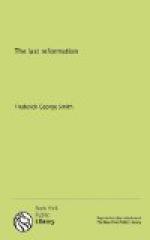From the foregoing considerations, we are certain that in the apostolic church the real emphasis was placed on life and that the governmental power and authority of the church was derived from its divine life in Christ and not from its organization. Apostolic church government was, therefore, more than the adoption of some particular form of external organization and administration.
[Sidenote: Divine administration]
The origin of the church was divine. Jesus said, “I will build my church.” And though, as we have seen, he employed human agents in its completion, these agents were so specially inspired and directed by Christ through the Holy Spirit that it was in reality his work. Jesus was not only the initial founder of the church, but he was its permanent head and governor. Isaiah, predicting the coming of Christ, declares that “the government shall be upon HIS shoulder” (Isa. 9:6). And again, we read that “HE is the head of the body, the church ... that in all things he might have the preeminence” (Col. 1:18). He it was who called and commissioned Paul and then personally directed his ministerial labors (Acts 26:13-19; 16:6-9). He it was who walked in the midst of the seven golden candlesticks, encouraging or reproving the congregations of Asia (Rev. 1:17, et seq.). He is “alive forever more” (Rev. 1:18); “the same yesterday, and today, and forever” (Heb. 13: 8); “upholding all things by the word of his power” (Heb. 1:3). “To him be glory in the church ... throughout all ages, world without end. Amen” (Eph. 3:21).
[Sidenote: Christ the living head]
Thus, the general nature of church government was an absolute monarchy, or, to use a better term, a theocracy. Christ was king and lawgiver, governor and administrator. Whoever the instruments employed in carrying out his purposes, whatever the scope of their particular activities, all were governed directly by Christ through the Holy Spirit. It was his church. He was its living head. No other church was known in those days. It was only when the living, vital union of Christ with his church was lost to view that men began endeavoring to strengthen the bonds of external union by unscriptural human organization, just as when life is departed from the physical body we seek by an embalming process to prevent its speedy dissolution.
[Sidenote: Delegated authority]
In order to understand church government, therefore, we must begin at the central source of authority and proceed to its varied manifestations. We have seen that Christ employed human agents in accomplishing his work; hence, in thus performing the work of Christ as commanded by Christ, and as personally directed by the Spirit of Christ, these men possessed the authority of Christ. Any church governmental authority that does not proceed directly from Christ through his Holy Spirit is but human authority, an usurped authority, and has no place in the real church of Christ.




